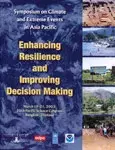Error message

Climate-related disasters can jeopardize social development goals—such as ameliorating poverty; providing adequate food, water, housing, sanitation, and health care; and protecting the environment—as well as economic development investments that provide employment and income. At the same time, the drive for social improvement and economic growth can create new disaster risks. Thus it is critical to integrate disaster management within the sustainable development agenda. National, regional, and global agencies are increasingly aware that resilience to climate variability and change is an integral component of sustainable development planning. They also recognize that Asia Pacific communities are among the most vulnerable in the world, particularly small island states and low-lying coastal areas. The region is particularly vulnerable because:
The East-West Center, Asian Disaster Preparedness Center, and Pacific Science Association convened the Symposium on Climate and Extreme Events in Asia Pacific: Enhancing Resilience and Improving Decision Making, as part of the 20th Pacific Science Congress. The Symposium was sponsored by NOAA/OGP, UNDP-BCPR, EWC, and ADPC/ECE (with funding from NOAA/OGP and the U.S. Agency for International Development, Office of Foreign Disaster Assistance). In the Symposium’s opening keynote address, Dr. Michael (Mickey) Glantz highlighted the importance of addressing the integrated “climate-society system.” He emphasized that we must consider societal context, decision-making frameworks, and information needs as well as the ability to monitor, understand, and anticipate changes in the physical climate system. We must create and sustain partnerships among the multidisciplinary community of scientists interested in climate adaptation, and the governments, resource managers, and businesses for whom adaptation represents a matter of survival and sustainable development. Individual presentations, working groups, and plenary discussions addressed five integrating themes:
The individual presentations on national and sectoral experiences confirmed the exposure and sensitivity of the Asia Pacific region to climate-related extreme events, and highlighted opportunities in a number of key sectors: agriculture and food security; drought, flood, and fire management; disaster management; tourism; health; water and other natural resource management; and fisheries. These presentations and subsequent working group discussions also reinforced the central importance of a highly collaborative, participatory process in which scientists and decision makers share responsibility for developing and applying climate information to enhance the resilience of Asia Pacific communities and improve decision making. |
Climate-related disasters can jeopardize social development goals—such as ameliorating poverty; providing adequate food, water, housing, sanitation, and health care; and protecting the environment—as well as economic development investments that provide employment and income. At the same time, the drive for social improvement and economic growth can create new disaster risks. Thus it is critical to integrate disaster management within the sustainable development agenda. National, regional, and global agencies are increasingly aware that resilience to climate variability and change is an integral component of sustainable development planning. They also recognize that Asia Pacific communities are among the most vulnerable in the world, particularly small island states and low-lying coastal areas. The region is particularly vulnerable because:
The East-West Center, Asian Disaster Preparedness Center, and Pacific Science Association convened the Symposium on Climate and Extreme Events in Asia Pacific: Enhancing Resilience and Improving Decision Making, as part of the 20th Pacific Science Congress. The Symposium was sponsored by NOAA/OGP, UNDP-BCPR, EWC, and ADPC/ECE (with funding from NOAA/OGP and the U.S. Agency for International Development, Office of Foreign Disaster Assistance). In the Symposium’s opening keynote address, Dr. Michael (Mickey) Glantz highlighted the importance of addressing the integrated “climate-society system.” He emphasized that we must consider societal context, decision-making frameworks, and information needs as well as the ability to monitor, understand, and anticipate changes in the physical climate system. We must create and sustain partnerships among the multidisciplinary community of scientists interested in climate adaptation, and the governments, resource managers, and businesses for whom adaptation represents a matter of survival and sustainable development. Individual presentations, working groups, and plenary discussions addressed five integrating themes:
The individual presentations on national and sectoral experiences confirmed the exposure and sensitivity of the Asia Pacific region to climate-related extreme events, and highlighted opportunities in a number of key sectors: agriculture and food security; drought, flood, and fire management; disaster management; tourism; health; water and other natural resource management; and fisheries. These presentations and subsequent working group discussions also reinforced the central importance of a highly collaborative, participatory process in which scientists and decision makers share responsibility for developing and applying climate information to enhance the resilience of Asia Pacific communities and improve decision making. |




